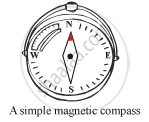Advertisements
Advertisements
प्रश्न
Write the answer in your word.
What are the practical uses of a magnet?
उत्तर
Magnets have a very wide range of uses:
- Magnetic compass: With the help of a magnetic compass, you can know the directions at a particular place. The red end of the needle indicates the north direction.

- Magnets in daily life: Magnets are used in refrigerator doors, as pin holders, in screwdrivers, etc.
- Magnet in junkyard: In the junkyard, you will see that a large magnet is attached at the bottom of the arm of a crane. The arm moves over a heap of junk and the magnet collects objects made of iron. The magnet used in a junkyard crane is not a natural or permanent magnet. It is a temporary magnet, which is called an electromagnet.
- Magnet in electrical appliances: Magnets are also used in many electrical appliances, such as electric bells, telephones, telegraphs, radios, loudspeakers, fans, electrical motors, electric generators, etc.
- Magnet for security: While going to some important places like temples, buildings, airports, etc., you will see equipment for inspection of people entering these places. These equipments use magnets and are known as metal detectors. These metal detectors are also used in the food processing industry to detect any unwanted iron/steel objects mixed unknowingly in food stuff.
संबंधित प्रश्न
Write true or false of the following statement.
Copper cannot be magnetised.
Define the following term regarding a bar magnet:
Magnetic equator
How will you do this?
Determine whether a material is magnetic or non-magnetic.
The real test of a magnet is ______.
Define the term Effective length of a magnet
One of the following is an example for a permanent magnet.
How can you identify non-magnetic materials? Give an example of a nonmagnetic material.
Thamizh Dharaga and Sangamithirai were playing with a bar magnet. They put the magnet down and it broke into four pieces. How many poles will be there?
What will happen when we place magnets near cell phones, computers, and DVDs?
